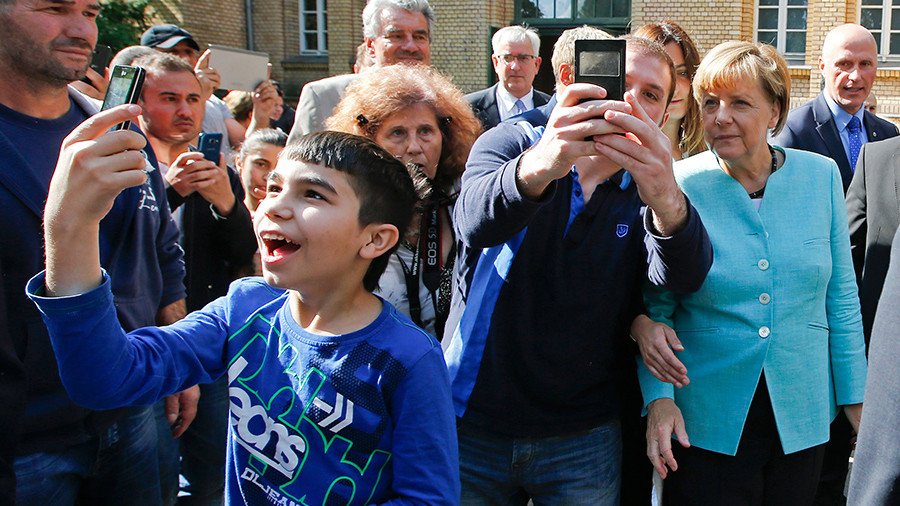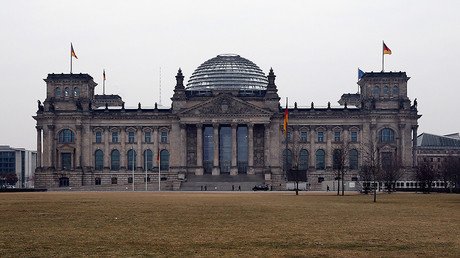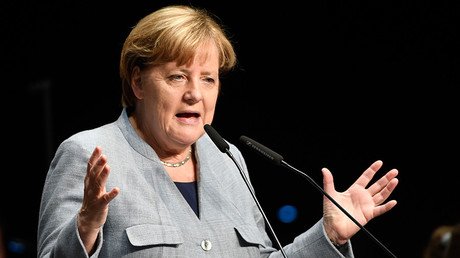The end of Merkel? Open-door migrant policy sends coalition running for the exits

German Chancellor Angela Merkel is facing an unprecedented political crisis that could upend her image as the “new leader of the west” after the Free Democrats (FDP) abruptly pulled out of negotiations with Merkel’s conservative bloc and the Greens.
Responses to the failed negotiations were immediate. The euro plunged to a 2-month low against the yen, and a planned meeting between Merkel and Dutch Prime Minister Mark Rutte was cancelled “in view of the political development last night,” according to German government spokesman Steffen Seibert.
Merkel won a fourth term as chancellor in September’s national Bundestag election, but her own party, the Christian Democratic Union (CDU), and its Bavarian ally the Christian Social Union (CSU), lost 65 seats between them — their worst showing in decades.
Coalition Chaos: Merkel’s 4th term in doubt https://t.co/JPT9aJas4Dpic.twitter.com/3yVoOFFuX1
— RT (@RT_com) November 20, 2017
With her own conservative bloc unable to command a majority in parliament, Merkel attempted to forge a so-called ‘Jamaica’ coalition with the pro-business FDP and the progressive Green Party.
But after more than four weeks of negotiations, FDP leader Christian Lindner announced on Sunday that his party was withdrawing from the proposed political alliance, citing irreconcilable differences between the would-be coalition partners.
Migrant crisis lays waste to Merkel’s coalition
Disagreements over climate, energy, and monetary policy required difficult compromises — but “the elephant in the room” that made the Jamaica coalition untenable is Germany’s migrant crisis, Maximilian Krah, a former CDU politician, told RT.
“The migrant issue is the main issue in the whole of Germany,” Krah insisted. “Whenever you go into private discussions, that’s the issue. But political correctness prevents the German public from debating it openly,” he said.
“If you read the declaration of the liberals when they broke up the coalition talks yesterday night, the migrant crisis was just one word among a lot of others but no one believes that they broke up because [of] the debate on ‘Industry 4.0’ or digital industry.”
Since 2015, over 1 million refugees have flooded into Germany from the Middle East and North Africa. Merkel’s uncompromising open door policy towards migrants galvanized Germany’s far-right Alternative for Germany (AfD), which scooped up 13 percent of the vote in September’s election.
Frank Hansel, a member of German parliament from AfD, told RT that Merkel’s unwillingness to change course led to the downfall of her proposed majority coalition — and ushers in the “end of the Merkel era.”
“She was not able or capable or willing to change her policies regarding the euro crisis which still divides Europe", Hansel said of Merkel. “She was not willing to change her policy regarding the illegal mass migration. So this really had to come to an end. The Jamaica government will never come into existence.”
Dr. @Alice_Weidel zum #JamaikaAbbruch: ❞Spätestens seit 2015 zeigt Merkel, dass sie weder willens noch imstande ist, den Willen des Volkes umzusetzen. Sie sollte die Konsequenzen ziehen & umgehend zurücktreten - #Neuwahlen sind nun vorzubereiten!❝➡️ https://t.co/nZimuFxPJspic.twitter.com/ozs4iArYOZ
— Alternative für Deutschland 🇩🇪 (@AfD) 20 ноября 2017 г.
A political system in crisis
Merkel’s options are limited as she attempts to navigate what is essentially unchartered territory in German politics.
The creation of a new majority coalition is unlikely, as it would require the staunchly anti-Merkel Social Democrats (SPD) to join forces with the conservatives. Hours after the Jamaica coalition talks failed on Sunday night, SPD deputy leader Thorsten Schäfer-Gumbel stated unequivocally that his party was “not the spare wheel on Angela Merkel’s careening car,” as cited by Deutsche Welle.
Forming a minority government, while possible, is a “long and humiliating procedure,” Dr. Rainer Rothfuss, a geopolitical analyst and consultant, told RT. “The German political system is in crisis. This has been clear already when we saw the election results in November,” he added.
According to Germany’s constitution, German President Frank-Walter Steinmeier has the option of nominating someone for the office of chancellor. In this scenario, Steinmeier would likely nominate Merkel, but if she failed to win an absolute majority in the Bundestag, it could trigger a new election within 60 days.
The end of Merkel?
Journalists, pundits, and politicians alike have now called into question the popular mantra that, in the wake of Trump’s presidential election victory, Merkel is the “new leader of the West.” The failed coalition will also likely hurt Germany’s standing within Europe, which has looked to Berlin for political and economic leadership, Rothfuss told RT.
“Germany, at the moment, has lost influence inside the EU, and I think that this reflects also the misguided policies of Germany in the past two or three years which started most of all with the 2015 refugee crisis which led to an influx of over 1 million refugees from the Middle East, and which also led, in consequence, to the Brexit vote,” said Rothfuss.
Two months after German elections and Mrs Merkel, much diminished by the result, still can’t form a government. So much for all that British chattering class nonsense about her being the new leader of the West.
— Andrew Neil (@afneil) 20 ноября 2017 г.
While Merkel’s fate is uncertain, experts argue that it is clear we are witnessing the “final stage” of her chancellorship.
“We’ve reached the final stage of Merkel’s chancellorship, but I can’t tell you how long this stage will last,” said Krah. “It can last 3 months or 3 years. But you can be sure you won’t see Merkel in charge by the year 2020.”














